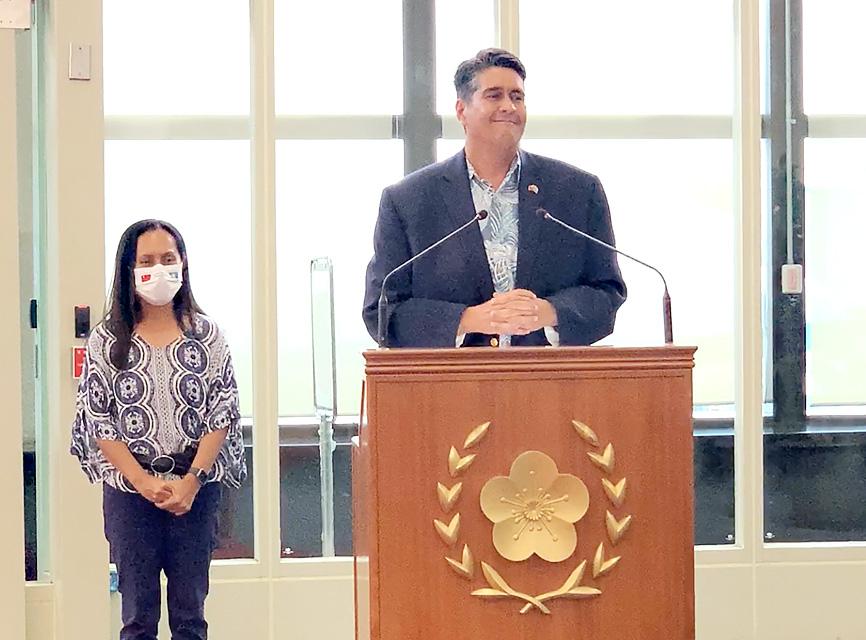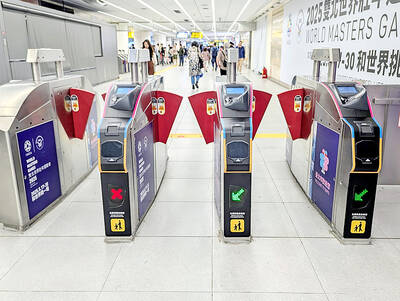He leads one of the world’s smallest nations, but Palauan President Surangel Whipps Jr said that it would not be bullied by anyone into deciding its future — least of all by China.
Whipps, 52, became president last year after defeating an opponent who favored closer ties with Beijing.
The Pacific nation of about 21,000 people is one of just 15 countries that still recognize Taiwan over China, something Whipps is adamant will not change under his watch, despite pressure from Beijing.

Photo: CNA
“If we were the last man standing, we should be because Taiwan has been with us from the beginning,” he told reporters via videoconference this week after returning from a trip to Taipei.
Beijing has whittled down Taiwan’s remaining diplomatic allies using a mixture of carrots and sticks. In 2019, it had two successes in the Pacific, persuading the Solomon Islands and Kiribati to switch sides.
Only Palau, the Marshall Islands, Nauru and Tuvalu remain in the region.
Whipps has emerged as the most vocally China-skeptical leader in the Pacific, something he says is forged from Beijing’s more aggressive stance under Chinese President Xi Jinping (習近平) and his own interactions with Chinese officials.
“I’ve had meetings with them and the first thing they said to me before, on a phone call, was: ‘What you’re doing is illegal, recognizing Taiwan is illegal. You need to stop it,’” he said.
“You know, that’s the tone they use,” he said. “We shouldn’t be told we can’t be friends with so and so.”
Whipps said that he would often receive calls on his mobile from Chinese officials in the run-up to last year’s elections.
“It would ring for like 16 times,” he said. “After the elections, I have not taken their calls.”
Beijing has largely opted for the diplomatic stick when it comes to Palau.
Palau saw explosive growth in the number of Chinese tourists in the early half of last decade, but in 2017, China suddenly banned package tours, a common move to apply economic stress.
That decision backfired, because it heightened Palauan awareness of Chinese pressure, Whipps said.
“That’s just an example of how it’s kind of bait,” he said, summarizing the Chinese position as: “You do this for me, then we expect this and this.”
That skepticism is music to Washington’s ears as it tries to shore up alliances in the Pacific to counter Beijing’s growing regional clout.
Palau was one of a group of Pacific islands administered by the US in the aftermath of World War II.
It became independent in 1994, but maintains close links with Washington.
Like other nearby Pacific nations, it has a 50-year defense agreement with the US known as the Compact of Free Association.
US forces are under Japanese pressure to draw down their massive bases in Okinawa and are looking to diversify across the Pacific.
Last year, then-US secretary of defense Mark Esper became the first Pentagon chief to visit Palau.
Whipps said that he is keen to see more US military bases, something he hopes will make his nation less reliant on tourism.
“I think there’s an opportunity for everybody to gain from this,” he said.
A key battlefield during World War II, Palau forms part of the “second island chain” that US military strategists see as key obstacles to China dominating the Pacific.
“The Japanese back then saw the strategic importance, and I think it still remains today,” Whipps said.
While Whipps has spent most of his life in Palau, he was born in Baltimore, Maryland, studied in the US and speaks with an American-tinged accent.
He renounced US citizenship to become a Palau senator, but he remains fervently pro-US.
He also described Taiwan, which began diplomatic relations with Palau in 1999, as more than just an ally.
“There’s a shared culture and history,” Whipps said.
Beijing’s push to keep Taiwan isolated has only heightened international sympathy for Taipei, he said.
“Taiwan is a free country,” Whipps said. “They’re a democracy and that should be respected. As diplomatic allies, you can’t just throw that out the door.”

A magnitude 6.4 earthquake struck off the coast of Hualien County in eastern Taiwan at 7pm yesterday, the Central Weather Administration (CWA) said. The epicenter of the temblor was at sea, about 69.9km south of Hualien County Hall, at a depth of 30.9km, it said. There were no immediate reports of damage resulting from the quake. The earthquake’s intensity, which gauges the actual effect of a temblor, was highest in Taitung County’s Changbin Township (長濱), where it measured 5 on Taiwan’s seven-tier intensity scale. The quake also measured an intensity of 4 in Hualien, Nantou, Chiayi, Yunlin, Changhua and Miaoli counties, as well as

Credit departments of farmers’ and fishers’ associations blocked a total of more than NT$180 million (US$6.01 million) from being lost to scams last year, National Police Agency (NPA) data showed. The Agricultural Finance Agency (AFA) said last week that staff of farmers’ and fishers’ associations’ credit departments are required to implement fraud prevention measures when they serve clients at the counter. They would ask clients about personal financial management activities whenever they suspect there might be a fraud situation, and would immediately report the incident to local authorities, which would send police officers to the site to help, it said. NPA data showed

ENERGY RESILIENCE: Although Alaska is open for investments, Taiwan is sourcing its gas from the Middle East, and the sea routes carry risks, Ho Cheng-hui said US government officials’ high-profile reception of a Taiwanese representative at the Alaska Sustainable Energy Conference indicated the emergence of an Indo-Pacific energy resilience alliance, an academic said. Presidential Office Secretary-General Pan Men-an (潘孟安) attended the conference in Alaska on Thursday last week at the invitation of the US government. Pan visited oil and gas facilities with senior US officials, including US Secretary of the Interior Doug Burgum, US Secretary of Energy Chris Wright, Alaska Governor Mike Dunleavy and US Senator Daniel Sullivan. Pan attending the conference on behalf of President William Lai (賴清德) shows a significant elevation in diplomatic representation,

The Taipei MRT is to begin accepting mobile payment services in the fall, Taipei Rapid Transit Corp said on Saturday. When the company finishes the installation of new payment units at ticketing gates in October, MRT passengers can use credit cards, Apple Pay, Google Pay and Samsung Pay, the operator said. In addition, the MRT would also provide QR payment codes — which would be compatible with Line Pay, Jkopay, iPass Money, PXPay Plus, EasyWallet, iCash Pay, Taiwan Pay and Taishin Pay — to access the railway system. Currently, passengers can access the Taipei MRT by buying a single-journey token or using EasyCard,